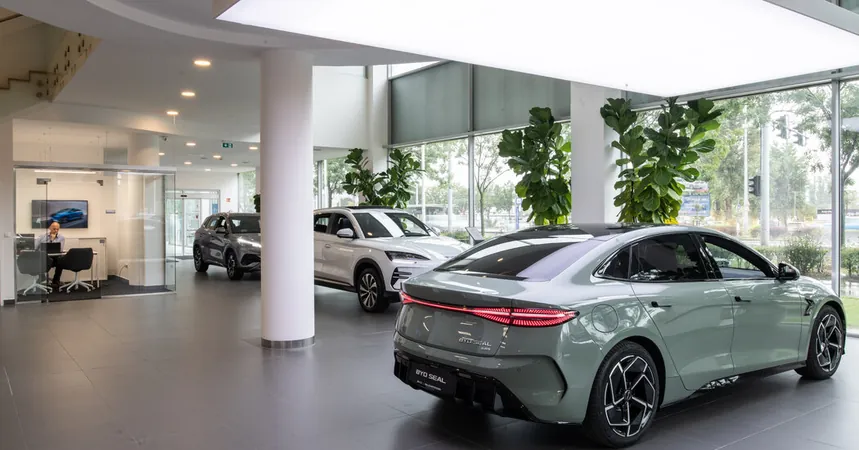
Europe Takes a Bold Stand: New Tariffs on Chinese Electric Vehicles Spark Transcontinental Tensions
2024-10-04
Author: Ying
Introduction
In a pivotal move that signals a shift in international trade dynamics, the European Union has officially decided to implement higher tariffs on electric vehicles (E.V.s) imported from China, a decision that could dramatically affect trade relations with one of its foremost partners. This decision, reached during a recent vote, reflects the EU's precarious balancing act between protecting its own automotive industry and navigating its complex economic relationship with China.
Details of the New Tariffs
The newly approved tariffs, designed to last five years and reaching as high as 45%, come as Europe strives to defend an industry that is vital to its economy. With billions of dollars at stake in trade between these two economic giants, this decision marks a response to escalating concerns surrounding the competitive advantages that Chinese manufacturers are perceived to enjoy, which some EU officials argue are bolstered by subsidies and unfair state backing.
A Shift Towards the United States
This bold step, albeit below the 100% tariffs set by North America, serves as a strong signal of Europe's determination to align more closely with the United States while still aiming for a pragmatic approach towards China. Noah Barkin, a senior fellow at the German Marshall Fund, emphasized that this vote illustrates a newfound consensus in Europe about needing to adopt a firmer stance against China's economic policies.
Divisions Within Europe
Crucially, the EU's vote was not unanimous; it spotlighted deep divides among member states about how to approach the Chinese challenge. Five countries voted against the tariffs, while 12 abstained. Germany, a powerhouse in the automotive sector, notably opposed the tariffs, fearing they could trigger a retaliatory trade war. Chancellor Olaf Scholz’s government faced pressure from both labor unions and industry leaders who cautioned that rising tariffs would stifle competition and could exacerbate the already shrinking demand for vehicles in Europe.
China's Response
Further complicating matters, China has condemned the EU's decision, branding it as "unfair" and indicative of protectionist policies that violate international trade norms. The Chinese government called for the EU to pause the implementation of these tariffs to allow room for continued negotiations—discussions that will carry on as both parties seek common ground. Notably, last year, the EU and China exchanged goods worth approximately €739 billion ($811 billion), making China the second most important trading partner for the bloc after the United States.
Potential Shifts in Production
Voices on the ground are varied. Some experts argue that these tariffs might encourage Chinese manufacturers to shift some production to Europe, a change that could potentially create jobs and infuse local industries with Chinese expertise. Already, companies like BYD, Chery, and Leapmotor are exploring opportunities on the continent, with BYD poised to open its first manufacturing facility in Europe.
National Security Concerns
The challenges are not just economic; the Biden administration has expressed national security concerns over internet-connected vehicles potentially enabling data access to Beijing—an issue that remains secondary for European policymakers, who are primarily focused on securing local jobs and market health.
Conclusion
As discussions resume next week, the global economic landscape hangs in the balance, with major implications not just for the automotive industries in Europe and China, but for the larger geopolitical environment. Will Europe manage to safeguard its industries without igniting a full-blown trade crisis? Only time will tell.

 Brasil (PT)
Brasil (PT)
 Canada (EN)
Canada (EN)
 Chile (ES)
Chile (ES)
 España (ES)
España (ES)
 France (FR)
France (FR)
 Hong Kong (EN)
Hong Kong (EN)
 Italia (IT)
Italia (IT)
 日本 (JA)
日本 (JA)
 Magyarország (HU)
Magyarország (HU)
 Norge (NO)
Norge (NO)
 Polska (PL)
Polska (PL)
 Schweiz (DE)
Schweiz (DE)
 Singapore (EN)
Singapore (EN)
 Sverige (SV)
Sverige (SV)
 Suomi (FI)
Suomi (FI)
 Türkiye (TR)
Türkiye (TR)